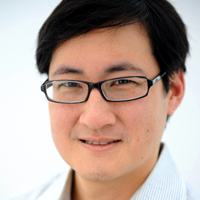
Stanley Chang
Professor of Mathematics
Research on positive scalar curvature and rigidity of manifolds, noncommutative geometry, tools of surgery theory
I am engaged in the study of the curvature and rigidity of high-dimensional manifolds, using such tools that appear in algebraic topology, differential geometry, index theory and C*-algebras. The examination of such properties has been of classical interest, but recent developments have reanimated the subject in both the compact and noncompact contexts. Currently I am co-authoring an advanced textbook on surgery methods and applications which will describe the many topological theorems proved in the 1970s and 1980s.
In the past years I have taught a wide variety of courses at all levels of the mathematics curriculum, including calculus, linear algebra, abstract algebra, real and complex analysis, topology and Galois Theory. More recently I have developed courses in Advanced Number Theory, Functional Analysis and Stochastic Processes. Many of our advanced students request independent study courses and research opportunities, and I have overseen such efforts in the study of modular forms, advanced analysis, representation theory and logic. In the Fall of 2016 I will be offering an Applied Calculus course that motivates theory and calculation with real-world problems in the life and social sciences.
At Wellesley I have served both on the 2015 Commission, the Academic Planning Committee and the Presidential Search Committee in 2016. In these campus bodies I am interested in helping the College maintain high academic standards for all of its students. In my own department I am very much involved in the effort to build our curricular offerings and to prepare our students for graduate studies. Along with Professor Oscar Fernandez, I co-created the Wellesley Emerging Scholars Initiative in the hopes to increase the participating by underrepresented minorities in the mathematical sciences.
I am an amateur fencer and have competed in some regional tournaments. Currently I hold a national E ranking. I play both piano and harpsichord and have performed some ensembles on campus. My love of mathematics extends to a love of language, and I spend some of each week reading Classical works written in Greek and Latin. Also I am a member of the Metropolitan Chorale, a Boston-area choir that performs choral works three times a year.
Education
- B.A., University of California-Berkeley
- M.A., University of Cambridge
- Ph.D., University of Chicago
Current and upcoming courses
Linear Algebra
MATH206
Linear algebra is one of the most beautiful subjects in the undergraduate mathematics curriculum. It is also one of the most important with many possible applications. In this course, students learn computational techniques that have widespread applications in the natural and social sciences as well as in industry, finance, and management. There is also a focus on learning how to understand and write mathematical proofs and an emphasis on improving mathematical style and sophistication. Topics include vector spaces, subspaces, linear independence, bases, dimension, inner products, linear transformations, matrix representations, range and null spaces, inverses, and eigenvalues.
-
Topics in Analysis Tpc: Lebesgue Theory
MATH303
Topic for 2024-2025: Lebesgue Theory. This course is a continuation of MATH 302 with a treatment of real analysis focusing on the theory of integration. We will see why Riemann integration is supplanted by Lebesgue integration, and how different metrics on function space yield different topological structures. Topics in this course will include the convergence of series of functions, summation tests, the Monotone Convergence Theorem, the Dominated Convergence Theorem, and Fatou's Lemma. If there is time, we will also study the theory of Fourier transforms.